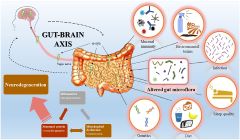The symposium was organized by the Gut Microbiota and Probiotic Science Foundation (India) and Medanta Institute of Education and Research, Gurugram, and Amity University, Gurugram

Photo courtesy Wikipedia
Our gut plays a vital role in the extraction of nutrients, the building of our immune system, and is connected to the brain via the vagus nerve also called the gut-brain axis. The microbial species in the gut are the body’s unsung heroes which regulate the brain function in good health & disease. Prof. N.K Ganguly (President, Gut Microbiota and Probiotic Science Foundation (India) inaugurated the event along with Dr. Naresh Trehan, Chairman and Managing Director, Medanta, TM - The Medicity, Gurugram), Dr. Padmakali Banerjee ( Pro Vice-chancellor, Dean Academics, Amity University, Haryana, India) & Arun Singhal (CEO, Food Safety and Standards Authority of India). They stressed the stellar role of probiotics in boosting immunity and the importance of a superior regulatory framework to ensure compliance and quality.
The two-day event also witnessed presentations by 6 International speakers, 10 National speakers, 3 young investigators, and two exciting panel discussions on “Emerging critical issues” and “Application of Probiotics”.
Prof. Siew C Ng from the Chinese University in Hongkong shared recent findings on the differences in the intestinal microbiota in Covid 19 patients. There was a depletion in the beneficial microbes in these patients which were observed even after they had recovered which could be linked to Long Covid.
Dr. Ryuta Amamoto from the Yakult Central Institute in Japan highlighted finding from studies that showed that regular consumption of a probiotic fermented milk drink resulted in stabilizing the intestinal microbiota in an elderly population aged 66-91 years and improved both hypertension and frequency of bowel movements.
While Dr. Mahendran Appukutty, Professor of Nutrition from the University of Malaysia discussed the use of psychobiotics in managing stress and anxiety in athletes to help improve their performance. Prof. Saurabh Dutta, Professor, Division in Neonatology, Post Graduate Medical Education and Research indicated that an imbalance in the intestinal microbiota precedes the onset of Necrotizing Enterocolitis and several meta-analyses have shown that prevention probiotics may reduce the risk of Necrotizing Enterocolitis and sepsis in neonates.
Prof. Nitya Gogtay, Prof. and Head, Clinical Pharmacology, KEM Hospital, Mumbai discussed the role of the gut microbes in shaping immune system maturation and activity said that Probiotics may influence the immunomodulatory effect of vaccines and offers an exciting area for both research and potential implementation with Covid and Non-Covid vaccines.
Dr. Asana Urooj, Professor of Nutrition, University of Mysore, deliberated on the differences in the intestinal microbiota in 30 autistic children with an increase in Prevotella and Sutterella sp. In Autistic Spectrum Disorder(ASD) cases, Succinate and Butyrate were the significant metabolites for the bacterial signatures identified. This link opens up avenues to modulate the gut microbiota in ASD by means of probiotics as a therapeutically safe option.
Prof. Ajay Bhalla, Director and Head, Department of Gastroenterology, Fortis Hospital, Noida said the role of probiotics is well established in infective and antibiotic-associated diarrhea but there is emerging evidence for their role in Irritable Bowel Syndrome and Constipation. An open-label study on 40 patients with functional constipation showed that probiotics along with the standard of care improved the overall constipation assessment score more than the standard of care alone. There was also an improvement in bowel movement, rectal pain, and abdominal distension in the probiotic group.

Subscribe To Our Newsletter & Stay Updated